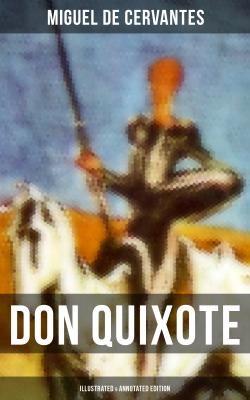DON QUIXOTE (Illustrated & Annotated Edition). Мигель де Сервантес Сааведра
Читать онлайн.| Название | DON QUIXOTE (Illustrated & Annotated Edition) |
|---|---|
| Автор произведения | Мигель де Сервантес Сааведра |
| Жанр | Языкознание |
| Серия | |
| Издательство | Языкознание |
| Год выпуска | 0 |
| isbn | 9788027232994 |
Could Miraflores change to El Toboso,
And London’s town to that which shelters thee!
Oh, could mine but acquire that livery
Of countless charms thy mind and body show so!
Or him, now famous grown — thou mad’st him grow so —
Thy knight, in some dread combat could I see!
Oh, could I be released from Amadis
By exercise of such coy chastity
As led thee gentle Quixote to dismiss!
Then would my heavy sorrow turn to joy;
None would I envy, all would envy me,
And happiness be mine without alloy.
GANDALIN, SQUIRE OF AMADIS OF GAUL,
To Sancho Panza, squire of Don Quixote
Sonnet
All hail, illustrious man! Fortune, when she
Bound thee apprentice to the esquire trade,
Her care and tenderness of thee displayed,
Shaping thy course from misadventure free.
No longer now doth proud knight-errantry
Regard with scorn the sickle and the spade;
Of towering arrogance less count is made
Than of plain esquire-like simplicity.
I envy thee thy Dapple, and thy name,
And those alforjas thou wast wont to stuff
With comforts that thy providence proclaim.
Excellent Sancho! hail to thee again!
To thee alone the Ovid of our Spain
Does homage with the rustic kiss and cuff.
FROM EL DONOSO, The MOTLEY POET,
On Sancho Panza and Rocinante
ON SANCHO
I am the esquire Sancho Pan —
Who served Don Quixote of La Man —;
But from his service I retreat —,
Resolved to pass my life discreet —;
For Villadiego, called the Si —,
Maintained that only in reti —
Was found the secret of well-be —,
According to the “Celesti —:”
A book divine, except for sin —
By speech too plain, in my opin —
ON ROCINANTE
I am that Rocinante fa —,
Great-grandson of great Babie —,
Who, all for being lean and bon —,
Had one Don Quixote for an own —;
But if I matched him well in weak —,
I never took short commons meek —,
But kept myself in corn by steal —,
A trick I learned from Lazaril —,
When with a piece of straw so neat —
The blind man of his wine he cheat — .
ORLANDO FURIOSO
To Don Quixote of La Mancha
Sonnet
If thou art not a Peer, peer thou hast none;
Among a thousand Peers thou art a peer;
Nor is there room for one when thou art near,
Unvanquished victor, great unconquered one!
Orlando, by Angelica undone,
Am I; o’er distant seas condemned to steer,
And to Fame’s altars as an offering bear
Valour respected by Oblivion.
I cannot be thy rival, for thy fame
And prowess rise above all rivalry,
Albeit both bereft of wits we go.
But, though the Scythian or the Moor to tame
Was not thy lot, still thou dost rival me:
Love binds us in a fellowship of woe.
The KNIGHT OF PHOEBUS
To Don Quixote of La Mancha
My sword was not to be compared with thine
Phoebus of Spain, marvel of courtesy,
Nor with thy famous arm this hand of mine
That smote from east to west as lightnings fly.
I scorned all empire, and that monarchy
The rosy east held out did I resign
For one glance of Claridiana’s eye,
The bright Aurora for whose love I pine.
A miracle of constancy my love;
And banished by her ruthless cruelty,
This arm had might the rage of Hell to tame.
But, Gothic Quixote, happier thou dost prove,
For thou dost live in Dulcinea’s name,
And famous, honoured, wise, she lives in thee.
FROM SOLISDAN
To Don Quixote of La Mancha
Sonnet
Your fantasies, Sir Quixote, it is true,
That crazy brain of yours have quite upset,
But aught of base or mean hath never yet
Been charged by any in reproach to you.
Your deeds are open proof in all men’s view;
For you went forth injustice to abate,
And for your pains sore drubbings did you get
From many a rascally and ruffian crew.
If the fair Dulcinea, your heart’s queen,
Be unrelenting in her cruelty,
If still your woe be powerless to move her,
In such hard case your comfort let it be
That Sancho was a sorry go-between:
A booby he, hard-hearted she, and you no lover.
DIALOGUE
Between Babieca and Rocinante
Sonnet
B. “How comes it, Rocinante, you’re so lean?”
R. “I’m underfed, with overwork I’m worn.”
B. “But what becomes of all the hay and corn?”
R. “My master gives me none; he’s much too mean.”
B.
